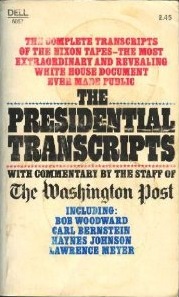 |
|
 |
|
 |
 |
 |
 |
 |
 |
 |
 |
 |
 |
| 2016 Election: | Hillary's book | Trump's book | Bernie's book | Ted Cruz's book | | | 2016 Senate Debates |
The Presidential Transcripts, with commentary by the Staff of the Washington Post  (Click for Amazon book review)
OnTheIssues.org BOOK REVIEW: This book describes itself as "The complete transcripts of the Nixon tapes -- the most extraordinary and revealing White House document ever made public." But in fact, it is not complete at all -- this book documents the Watergate investigation as a "work in progress." If one seeks a complete historical record, this book is not it -- it was published in May 1974, when several months more of Watergate investigation had yet to occur. If one seeks a snapshot into the controversy that took down a president, then this book is it. Most important for students of history reading this book is its timing. Nixon's White House released SOME tapes -- but not ALL tapes -- on April 30, 1974. This book transcribes all of the relevant tapes released at that time, and analyzes them. But the key question about Watergate at the time was, "What did Nixon know, and when did he know it?" This book documents in great detail the period from September 1972 through April 1973. The Watergate prosecutors thought that period was the most significant -- and subpoenaed the White House tapes accordingly -- because Nixon had stated that he was only made fully aware of Watergate as of March 21, 1973. The tapes transcribed in this book clarify that Nixon knew about Watergate as least as early as September 15, 1972, and therefore that he lied to the American public when he declared that he was mostly unaware until March 1973. Getting these tapes released was certainly a significant event in American history. Prior to their release, most people (including the White House staff being taped) were unaware that the Oval Office had a secret taping system (Nixon knew, of course). The revelation of these tapes' existence (which occurred on July 16, 1973) was a major breakthrough in the Watergate investigation. And as detailed in this book, these tapes revealed that Nixon did knowingly lie to the American people. In addition, these tapes revealed that Nixon never had any intention of full disclosure about Watergate; that he was at all times willing to pay blackmail to cover up as much as possible; and that he considered using the Mafia to assist in the cover-up. But these tapes do not include the "smoking gun." That term refers to a June 23, 1972 tape from the White House -- several months prior to the earliest date of the transcripts in this book. The "smoking gun" tape revealed that on that date, only six days after the Watergate break-in, Nixon was aware of the break-in and actively sought FBI assistance in a cover-up, on grounds of "national security." The "smoking gun" tape was released AFTER this book was published -- by court order in July 1974. When that tape was finally released, on Aug. 5, 1974, all remaining support for Nixon's presidency disappeared. Nixon resigned three days later. Hence this book reveals only PART of the story. An important part, but not an historical retrospective. Watergate was an ongoing investigation at the time this book was published, with numerous open questions yet to be answered. This book does represent journalism at its best -- pushing for people in power to tell the whole truth to the American people, by publicizing what is known and what more might be hidden. Other books in our extensive collection on Nixon do detail the historical perspective -- but this book is more "news" than "history." Reading this book is not easy. Transcripts are notoriously hard to read, because they don't have any context. These transcripts are even harder to read than most, because they are recordings made by a secret taping system, which means the microphones could not be placed in locations ensuring high quality sound. Many segments are marked "inaudible" or "unintelligible" because no one could figure out what was said (that's in addition to those segments marked "expletive deleted," the term made famous by these White House tapes!). To provide context, the Washington Post published the tape transcripts with analysis from several different reporters. Our excerpts cite those analyses rather than the raw transcribed material. This book is certainly a classic of U.S. political history. But it's more of a reference book than an exciting read. Historians will refer to it in the future, but the real story is the context in which it was published -- it was a key part of the taking down of a corrupt presidential administration, and a key component in the fall of Richard Nixon. -- Jesse Gordon, editor-in-chief, OnTheIssues.org, March 2013
| |||||||||||||||||||||||||||||||||||||||||||
| |||||||||||||||||||||||||||||||||||||||||||
Page last edited: Feb 26, 2019